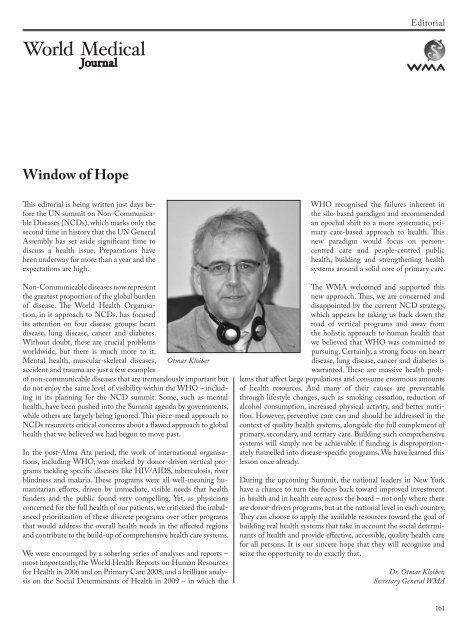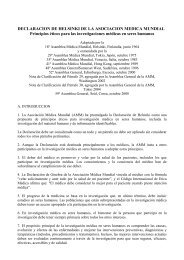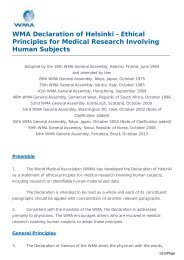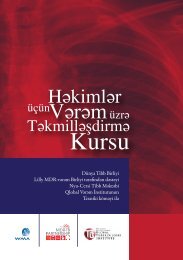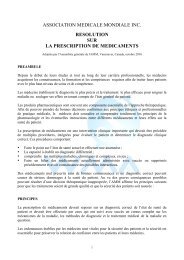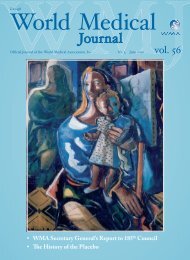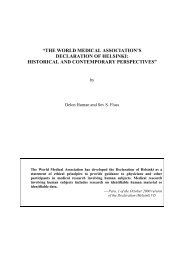WMJ 05 2011 - World Medical Association
WMJ 05 2011 - World Medical Association
WMJ 05 2011 - World Medical Association
Create successful ePaper yourself
Turn your PDF publications into a flip-book with our unique Google optimized e-Paper software.
Editorial<br />
Window of Hope<br />
This editorial is being written just days before<br />
the UN summit on Non-Communicable<br />
Diseases (NCDs), which marks only the<br />
second time in history that the UN General<br />
Assembly has set aside significant time to<br />
discuss a health issue. Preparations have<br />
been underway for more than a year and the<br />
expectations are high.<br />
Non-Communicable diseases now represent<br />
the greatest proportion of the global burden<br />
of disease. The <strong>World</strong> Health Organisation,<br />
in it approach to NCDs, has focused<br />
its attention on four disease groups: heart<br />
disease, lung disease, cancer and diabetes.<br />
Without doubt, these are crucial problems<br />
worldwide, but there is much more to it.<br />
Mental health, muscular-skeletal diseases, Otmar Kloiber<br />
accident and trauma are just a few examples<br />
of non-communicable diseases that are tremendously important but<br />
do not enjoy the same level of visibility within the WHO – including<br />
in its planning for the NCD summit. Some, such as mental<br />
health, have been pushed into the Summit agenda by governments,<br />
while others are largely being ignored. This piece-meal approach to<br />
NCDs resurrects critical concerns about a flawed approach to global<br />
health that we believed we had begun to move past.<br />
In the post-Alma Ata period, the work of international organisations,<br />
including WHO, was marked by donor-driven vertical programs<br />
tackling specific diseases like HIV/AIDS, tuberculosis, river<br />
blindness and malaria. These programs were all well-meaning humanitarian<br />
efforts, driven by immediate, visible needs that health<br />
funders and the public found very compelling. Yet, as physicians<br />
concerned for the full health of our patients, we criticized the imbalanced<br />
prioritization of these discrete programs over other programs<br />
that would address the overall health needs in the affected regions<br />
and contribute to the build-up of comprehensive health care systems.<br />
We were encouraged by a sobering series of analyses and reports –<br />
most importantly, the <strong>World</strong> Health Reports on Human Resources<br />
for Health in 2006 and on Primary Care 2008, and a brilliant analysis<br />
on the Social Determinants of Health in 2009 – in which the<br />
WHO recognised the failures inherent in<br />
the silo-based paradigm and recommended<br />
an epochal shift to a more systematic, primary<br />
care-based approach to health. This<br />
new paradigm would focus on personcentred<br />
care and people-centred public<br />
health, building and strengthening health<br />
systems around a solid core of primary care.<br />
The WMA welcomed and supported this<br />
new approach. Thus, we are concerned and<br />
disappointed by the current NCD strategy,<br />
which appears be taking us back down the<br />
road of vertical programs and away from<br />
the holistic approach to human health that<br />
we believed that WHO was committed to<br />
pursuing. Certainly, a strong focus on heart<br />
disease, lung disease, cancer and diabetes is<br />
warranted. These are massive health problems<br />
that affect large populations and consume enormous amounts<br />
of health resources. And many of their causes are preventable<br />
through lifestyle changes, such as smoking cessation, reduction of<br />
alcohol consumption, increased physical activity, and better nutrition.<br />
However, preventive care can and should be addressed in the<br />
context of quality health systems, alongside the full complement of<br />
primary, secondary, and tertiary care. Building such comprehensive<br />
systems will simply not be achievable if funding is disproportionately<br />
funnelled into disease-specific programs. We have learned this<br />
lesson once already.<br />
During the upcoming Summit, the national leaders in New York<br />
have a chance to turn the focus back toward improved investment<br />
in health and in health care across the board – not only where there<br />
are donor-driven programs, but at the national level in each country.<br />
They can choose to apply the available resources toward the goal of<br />
building real health systems that take in account the social determinants<br />
of health and provide effective, accessible, quality health care<br />
for all persons. It is our sincere hope that they will recognize and<br />
seize the opportunity to do exactly that.<br />
Dr. Otmar Kloiber,<br />
Secretary General WMA<br />
161


